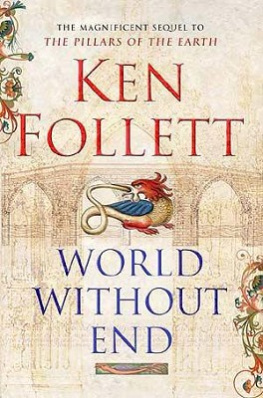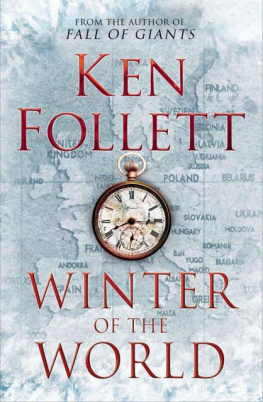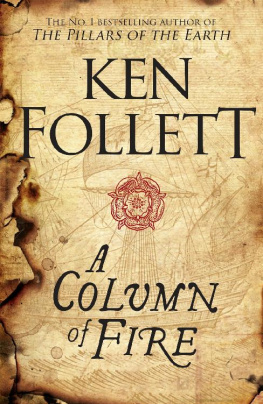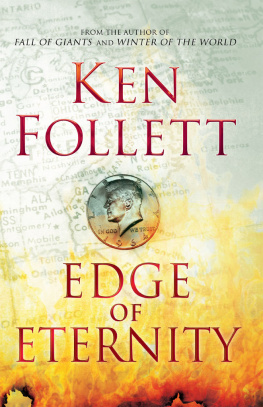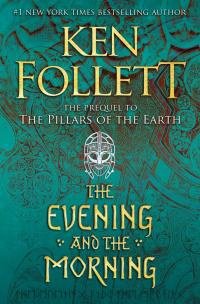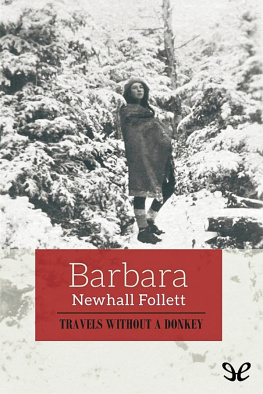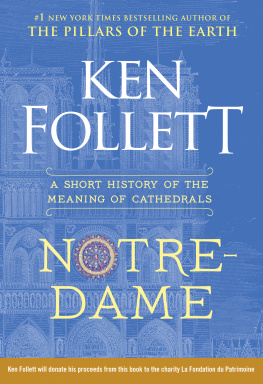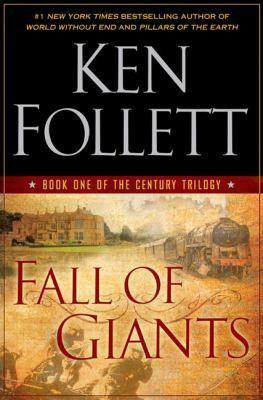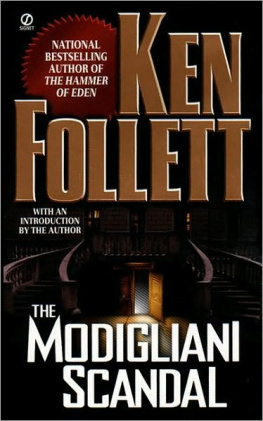Ken Follett - World Without End
Here you can read online Ken Follett - World Without End full text of the book (entire story) in english for free. Download pdf and epub, get meaning, cover and reviews about this ebook. year: 2007, publisher: Dutton Adult, genre: Art. Description of the work, (preface) as well as reviews are available. Best literature library LitArk.com created for fans of good reading and offers a wide selection of genres:
Romance novel
Science fiction
Adventure
Detective
Science
History
Home and family
Prose
Art
Politics
Computer
Non-fiction
Religion
Business
Children
Humor
Choose a favorite category and find really read worthwhile books. Enjoy immersion in the world of imagination, feel the emotions of the characters or learn something new for yourself, make an fascinating discovery.
- Book:World Without End
- Author:
- Publisher:Dutton Adult
- Genre:
- Year:2007
- Rating:3 / 5
- Favourites:Add to favourites
- Your mark:
- 60
- 1
- 2
- 3
- 4
- 5
World Without End: summary, description and annotation
We offer to read an annotation, description, summary or preface (depends on what the author of the book "World Without End" wrote himself). If you haven't found the necessary information about the book — write in the comments, we will try to find it.
World Without End — read online for free the complete book (whole text) full work
Below is the text of the book, divided by pages. System saving the place of the last page read, allows you to conveniently read the book "World Without End" online for free, without having to search again every time where you left off. Put a bookmark, and you can go to the page where you finished reading at any time.
Font size:
Interval:
Bookmark:
Gwenda was eight years old, but she was not afraid of the dark.
When she opened her eyes she could see nothing, but that was not what scared her. She knew where she was.
She was at Kingsbridge Priory, in the long stone building they called the hospital, lying on the floor in a bed of straw. Her mother lay next to her, and Gwenda could tell, by the warm milky smell, that Ma was feeding the new baby, who did not yet have a name. Beside Ma was Pa, and next to him Gwenda's older brother, Philemon, who was twelve.
The hospital was crowded, and though she could not see the other families lying along the floor, squashed together like sheep in a pen, she could smell the rank odor of their warm bodies. When dawn broke it would be All Hallows, a Sunday this year and therefore an especially holy day. By the same token the night before was All Hallows Eve, a dangerous time when evil spirits roamed freely. Hundreds of people had come to Kingsbridge from the surrounding villages, as Gwenda's family had, to spend Halloween in the sanctified precincts of the priory, and to attend the All Hallows service at daybreak.
Gwenda was wary of evil spirits, like every sensible person; but she was more scared of what she had to do during the service.
She stared into the gloom, trying not to think about what frightened her. She knew that the wall opposite her had an arched window. There was no glass - only the most important buildings had glass windows - but a linen blind kept out the cold autumn air. However, she could not even see a faint patch of gray where the window should be. She was glad. She did not want the morning to come.
She could see nothing, but there was plenty to listen to. The straw that covered the floor whispered constantly as people stirred and shifted in their sleep. A child cried out, as if woken by a dream, and was quickly silenced by a murmured endearment. Now and again someone spoke, uttering the half-formed words of sleep talk. Somewhere there was the sound of two people doing the thing parents did but never spoke of, the thing Gwenda called grunting because she had no other word for it.
Too soon, there was a light. At the eastern end of the long room, behind the altar, a monk came through the door carrying a single candle. He put the candle down on the altar, lit a taper from it, and went around touching the flame to the wall lamps, his long shadow reaching up the wall each time like a reflection, his taper meeting the shadow taper at the wick of the lamp.
The strengthening light illuminated rows of humped figures on the floor, wrapped in their drab cloaks or huddled up to their neighbors for warmth. Sick people occupied the cots near the altar, where they could get the maximum benefit from the holiness of the place. At the opposite end, a staircase led to the upper floor, where there were rooms for aristocratic visitors: the earl of Shiring was there now with some of his family.
The monk leaned over Gwenda to light the lamp above her head. He caught her eye and smiled. She studied his face in the shifting light of the flame and recognized him as Brother Godwyn. He was young and handsome, and last night he had spoken kindly to Philemon.
Beside Gwenda was another family from her village: Samuel, a prosperous peasant with a large landholding, and his wife and two sons, the youngest of whom, Wulfric, was an annoying six-year-old who thought that throwing acorns at girls then running away was the funniest thing in the world.
Gwenda's family was not prosperous. Her father had no land at all, and hired himself out as a laborer to anyone who would pay him. There was always work in the summer, but after the harvest was gathered in and the weather began to turn cold, the family often went hungry.
That was why Gwenda had to steal.
She imagined being caught: a strong hand grabbing her arm, holding her in an unbreakable grip while she wriggled helplessly; a deep, cruel voice saying, 'Well, well, a little thief'; the pain and humiliation of a whipping; and then, worst of all, the agony and loss as her hand was chopped off.
Her father had suffered this punishment. At the end of his left arm was a hideous wrinkled stump. He managed well with one hand - he could use a shovel, saddle a horse, and even make a net to catch birds - but all the same he was always the last laborer to be hired in the spring, and the first to be laid off in the autumn. He could never leave the village and seek work elsewhere, because the amputation marked him as a thief, so that people would refuse to hire him. When traveling, he tied a stuffed glove to the stump, to avoid being shunned by every stranger he met; but that did not fool people for long.
Gwenda had not witnessed Pa's punishment - it had happened before she was born - but she had often imagined it, and now she could not help thinking about the same thing happening to her. In her mind she saw the blade of the axe coming down on her wrist, slicing through her skin and her bones, and severing her hand from her arm, so that it could never be reattached; and she had to clamp her teeth together to keep from screaming out loud.
People were standing up, stretching and yawning and rubbing their faces. Gwenda got up and shook out her clothes. All her garments had previously belonged to her older brother. She wore a woolen shift that came down to her knees and a tunic over it, gathered at the waist with a belt made of hemp cord. Her shoes had once been laced, but the eyelets were torn and the laces gone, and she tied them to her feet with plaited straw. When she had tucked her hair into a cap made of squirrel tails, she had finished dressing.
She caught her father's eye, and he pointed surreptitiously to a family across the way, a couple in middle age with two sons a little older than Gwenda. The man was short and slight, with a curly red beard. He was buckling on a sword, which meant he was a man-at-arms or a knight: ordinary people were not allowed to wear swords. His wife was a thin woman with a brisk manner and a grumpy face. As Gwenda scrutinized them, Brother Godwyn nodded respectfully and said: 'Good morning, Sir Gerald, Lady Maud.'
Gwenda saw what had attracted her father's notice. Sir Gerald had a purse attached to his belt by a leather thong. The purse bulged. It looked as if it contained several hundred of the small, thin silver pennies, halfpennies, and farthings that were the English currency - as much money as Pa could earn in a year if he had been able to find employment. It would be more than enough to feed the family until the spring plowing. The purse might even contain a few foreign gold coins, florins from Florence or ducats from Venice.
Gwenda had a small knife in a wooden sheath hanging from a cord around her neck. The sharp blade would quickly cut the thong and cause the fat purse to fall into her small hand - unless Sir Gerald felt something strange and grabbed her before she could do the deed...
Godwyn raised his voice over the rumble of talk. 'For the love of Christ, who teaches us charity, breakfast will be provided after the All Hallows service,' he said. 'Meanwhile, there is pure drinking water in the courtyard fountain. Please remember to use the latrines outside - no pissing indoors!'
The monks and nuns were strict about cleanliness. Last night, Godwyn had caught a six-year-old boy peeing in a corner, and had expelled the whole family. Unless they had a penny for a tavern, they would have had to spend the cold October night shivering on the stone floor of the cathedral's north porch. There was also a ban on animals. Gwenda's three-legged dog, Hop, had been banished. She wondered where he had spent the night.
When all the lamps were lit, Godwyn opened the big wooden door to the outside. The night air bit sharply at Gwenda's ears and the tip of her nose. The overnight guests pulled their coats around them and began to shuffle out. When Sir Gerald and his family moved off, Pa and Ma fell into line behind them, and Gwenda and Philemon followed suit.
Font size:
Interval:
Bookmark:
Similar books «World Without End»
Look at similar books to World Without End. We have selected literature similar in name and meaning in the hope of providing readers with more options to find new, interesting, not yet read works.
Discussion, reviews of the book World Without End and just readers' own opinions. Leave your comments, write what you think about the work, its meaning or the main characters. Specify what exactly you liked and what you didn't like, and why you think so.

